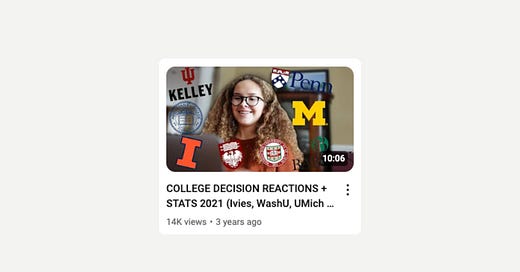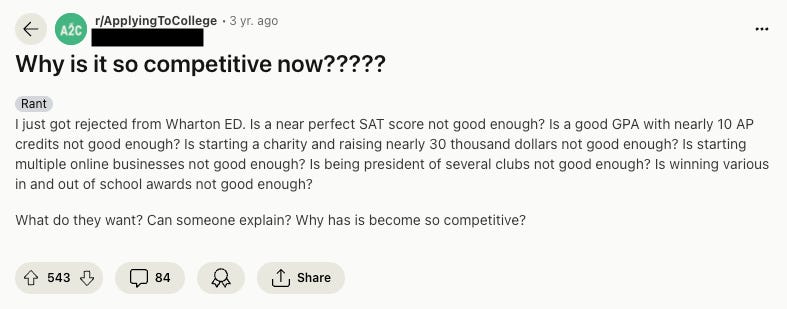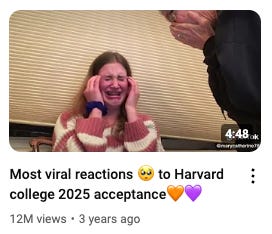When Prestige Fails: Mimetic Desire in College Admissions
Every year, 100,000+ high school students apply for admission to America's top schools. Students' identities are at stake.
My obsession with college prestige began my sophomore year of high school. I toured Vanderbilt, where the admissions officers boasted its sub-10% acceptance rate and perfect SAT scores.
Walking around the quad, I was in awe of every student. They must be exceptional. In that instant, I decided: I want to attend a school like Vanderbilt, too. For the next 2 years, I pinned my identity on college admissions. I wanted the world to think I was exceptional.
🎓 Applying to My Dream College
My dream school was the University of Pennsylvania. Wharton, its Ivy League business school, is #1 in America. Clearly, I belonged there — so I applied early decision my senior year of high school. I waited 6 long weeks for results to release…
December 16, 2020. While my family was surrounded by palm trees in a Florida hot tub, I was above them, on the hotel room’s balcony, writing college application essays. That night, Penn admission results would be released. I barely touched the hamburger on my dinner plate. I had shivers despite the 80-degree weather.
As I opened my laptop, my throat was dry. My shaky mouse clicked the “View Update” button:
It was my first true rejection. The first time my life did not go according to plan. I felt like my potential had hit a ceiling. I would never be a Penn student. I failed.
My family took me to Sprinkles Ice Cream. As I ate the mint chocolate chip cone, I cried in the back of the car.
In the hotel room at night, I sobbed. The only reason I didn’t sob harder was because my brother was sleeping in the room next door.
My future crumbled before me. I would never walk the cobblestone streets of old city Philadelphia. I couldn’t wear my Wharton sweatshirt. Because Penn rejected me, I could no longer become an entrepreneur. I couldn’t marry who I wanted to in 10 years because I would never find “my people.” I was destined to live just below my dreams.
I wasn’t devastated because I would never attend Penn. I was devastated because I couldn’t be the person I thought attending Penn would have validated me into becoming. I thought Penn’s 6% acceptance rate would transform me into the person I dreamed of. But I’m still me.
🫂 The Community of Rejects
That year, over 53,000 other students were rejected from Penn — a 5.7% acceptance rate for the class of 2025.
On the sub-Reddit r/ApplyingtoCollege, 1,000,000+ applicants commiserate on the cutthroat admissions cycle every year. The majority of high school students are happy to attend their state school or go straight into the workforce. But for the top 10% of applicants, the admissions cycle becomes much more — it feels like life or death.
🧠 The Philosophy That Changed My Life
Now, I finished my junior year at Washington University in St. Louis. The past 4 years have been the most tumultuous of my life so far. The highest highs and lowest lows.
I mistakenly modeled my life around prestige: first, college acceptance; then, seeking a six-figure career. My life felt bipolar: the same thoughts that elated me and provoked optimism about my future were the same thoughts that held the power to spin me into days-long pits of anxiety, wondering how I would ever succeed in life.
I didn’t know what to value. I thought this was life now. The “real world”: an endless competition for more.
Some time in my sophomore year of college, I read the two articles “The Trouble with Optionality” by Mihir Desai and “College as an Incubator of Girardian Terror” by Dan Wang. My world view began to shift.
I discovered a philosophy that clicked everything into place. I’ve learned to quell the cycle of prestige and begin to live a life that I value, apart from comparison to others. This philosophy was developed in the 20th century, by French philosopher Rene Girard.
Mimetic Desire: We want something because other people around us want it. We don’t often desire things for the things themselves, but for what the things say about us.
In the next 3 essays, I will share how mimetic theory has transformed me. Because of mimetic theory, I stopped striving for a 4.0 GPA. I pursued internships in media startups rather than finance. I play tuba in my college wind ensemble.
I hope my writing reaches other high school and college students — or their loved ones — to quell the endless prestige cycle faster than I did. So you can make decisions based on what you want, rather than what the people around you want.
🥇 Broken College Rankings
To applicants, a college’s ranking matters more than the actual school.
On the r/ApplyingtoCollege forum, students coined the term:
Shotgunning: a strategy of applying to 15+ top colleges, in hopes of getting admitted to one.
It doesn’t matter which college they attend, as long as it’s prestigious.
The internet has amplified mimetic rivalry. On YouTube and TikTok, students share their Ivy League acceptances to millions of viewers. College admissions are not only within high schools. Now, students compare themselves with every applicant across the world.
Starting senior year, I drafted my list of colleges:
University of Pennsylvania
University of Chicago
Washington University in St. Louis
University of Michigan
University of Illinois
Not by coincidence, my colleges were in order from lowest to highest acceptance rate.
The problem with college rankings lies in its very name: “rankings.” By pitting schools against each other, schools are valued based on comparison — not objective merit. Sure, merit is correlated with ranking, but ranking is not an end in itself.
This is a trap I, and many other college applicants, fall into: being more swayed by subjective desire than objective desire. Let’s nerd out on philosophy together.
⚖️ 2 Types of Desire
According to Girard, there are 2 types of desire:
Subjective (Metaphysical) Desire: “I want this object/achievement because of what it says about me. The value is my identity.”
Objective (Physical) Desire: “I want this object for itself. The value is its utility and features.”
At first, prestige may exist because of a slight increase in utility. Compared to University of Illinois, Penn has smaller class sizes, more Nobel-winning professors, and a larger endowment. Rankings correlate with quality.
But the problem with prestige is that it’s based on subjective desire: the value of the object you seek is directly tied to how many people DON’T have that object. Prestige is fleeting and only exists in comparison.
A quick example…
Subjective Desire: If suddenly Penn’s acceptance rate became 100%, it would have stopped being my dream school, even if nothing else about it changed. It would no longer make me feel exceptional.
Objective Desire: My favorite ice cream flavor is vanilla with Reese’s and cookie dough. As long as I’m eating it, I don’t care how many other people are eating it. My enjoyment is the same.
I use 1 question to determine whether a desire I have is subjective or objective:
“If someone else had more of _____, would it make me feel worse about what I have?”
If something becomes more valuable the scarcer it is, it probably derives its value from social competition, not the object itself.
🏫 College Choice Is Subjective
Most often, logic is subservient to our desires. We decide what we want — based on mimesis — then falsely rationalize why the most prestigious option (the option we want) is objectively the best option.
I decided I wanted to attend Penn after seeing its #1 business ranking. Then, I researched the features of Penn itself. Located in Philadelphia! A well-rounded curriculum! A double major in Marketing & Communications! It’s objectively my dream school!
Rankings and school quality are correlated, not causal. Penn likely has better academics, professors, and post-grad opportunities than Penn State, for example. At least, I hope Penn’s $21 billion endowment is going somewhere.
But the perceived difference between Penn (the Ivy League) and Penn State is massively inflated by Penn’s subjective desire — its selectivity and prestige. Subjective desire is fleeting. It has no impact on an individual student’s success. It only gives the false promise of turning you into someone you’re not — someone “more” than you are.
But the trick is: as long as you’re dependent on an external object to feel “more,” that object will never give it to you. Especially if its value is based in comparison.
“Research on the impact of college selection has focused on comparing the earnings of graduates of different colleges. In 1999, economists Alan Krueger and Stacy Berg Dale published a widely read study that compared the earnings of graduates of elite colleges with those of “moderately selective” schools. The latter group was composed of people who had been admitted to an elite college but chose to attend another school.
The economists found that the earnings of the two groups 20 years after graduation differed little or not at all. A larger follow-up study, released in 2011 and covering 19,000 college graduates, reached a similar conclusion: whether you went to Penn or Penn State, Williams College or Miami University of Ohio, job outcomes were unaffected in terms of earnings.”
💡 Students who were admitted to an elite college, but chose to attend a less prestigious school, had the same outcomes 20 years after graduation as their would-be peers who attended elite colleges.
No matter where you go to college, you’re still you. It matters much more whether you’re the type of person who’s even applying to an elite school — who has the drive and intelligence to succeed wherever you go — than whether you attend the school itself. The objective values between colleges are more equal than their inflated prestige leads us to believe. There is enough room for everyone.
🥊 “I refuse to join any club that would have me for a member.” -Groucho Marx
College admissions, for me, was much more about external validation than the function of the school I would attend.
Subjective desire comes from a place of lack. We want to be more than we currently are. We can picture the feeling so vividly — a fullness of being — though we can’t quite articulate it.
By “refusing to join any club that would have me for a member,” we admit our desperate need for validation. We want the object not for itself, but for what the object says about us — even if we are unchanged. And if it’s an object we think we’re already “worthy” of, then we have no desire for it because it won’t transform us into the “fuller” person we want to be. It’s a sad, self-perpetuating cycle — but we can stop it.
❤️ Grounded in Love
The night I was rejected from Penn, one picture lifted my mood:
My mom shared this picture of me and my brother at dinner earlier that night, before the rejection. I read it repeatedly. My heart swelled, and I sobbed harder.
Her support grounded me to who I’ve always been. Wharton reject or not, I was loved, “adored,” and a full person. I still deserved “good luck and love and laughter forever,” no matter what ❤️
This essay is part 1/3 in my series “Mimetic Desire in College”:
Mimetic Desire in College Admissions
Mimetic Desire in Career Choice (releasing July 3rd)
Escaping Mimesis (releasing July 17th)
Sources:
Jonathan Bi’s lecture series (YouTube)
“Wanting” by Luke Burgis
Rene Girard
“Violence and the Sacred: College as an incubator of Girardian terror” by Dan Wang
Mimetic Theory in 4 Minutes (YouTube)












...this idea, mimetic theory, offers so much...so much of life is practice, and practice's ends are repetitious depth of the actions/etc. repeated...but in that repetition and the depths we gain, so too do we lose in possibility (sometimes)...opening the door that each rejection might be an opportunity to do something else, and that something else might even be something better (or more needed) is a powerful way to live...no's can be disappointing, but they can also just be pointing, arrows sending us in a different direction...rad article great read thank you...